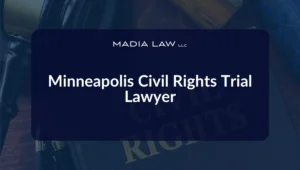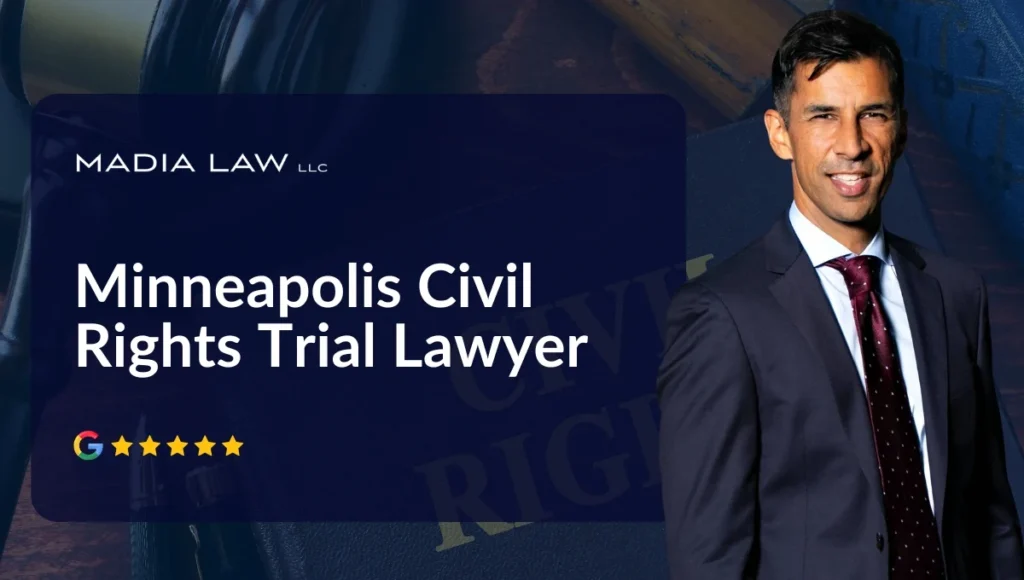
A large and rewarding part of our practice is holding the government accountable when it violates the civil rights of citizens. “Civil rights” can mean different things to different people. To us, it refers to the government overstepping its authority when dealing with citizens. We handle police shootings, police beatings (including wrongful use of tasers), wrongful arrest and search claims, defamation of character, and discrimination in public accommodations.
What Our Minneapolis Civil Rights Trial Lawyer Can Do for You
At Madia Law LLC, our Minneapolis civil rights trial lawyer fights tirelessly for individuals and families who’ve suffered government abuse, neglect, or excessive force. We pursue justice through civil rights litigation in the most serious cases involving police shootings, in-custody deaths, and jail suicides.
Representation for Victims of Police Shootings
If a loved one was shot and killed by police officers, please accept our deepest condolences. We know that no legal outcomes can erase your pain.
Under the U.S. Constitution, however, you have protection, and if officers used unlawful force, you may pursue a claim under 42 U.S.C. § 1983 to hold the government accountable for civil rights violations.
Generally, officers will argue that they are protected by “qualified immunity” for their actions. That means that, to recover, plaintiffs need to show more than the officers were just negligent or didn’t do their job properly. Instead, plaintiffs must show that the officers knowingly violated an established constitutional right.
In shooting cases, that generally means demonstrating that the officers knew they were dealing with someone who did not pose a threat to themselves or others, but the officers opened fire anyway. For example, if officers know that a suspect they are dealing with is unarmed, handcuffed, or otherwise doesn’t pose a threat, but the officers shoot the suspect anyway, they will have a very difficult time arguing that their actions are protected by qualified immunity.
Legal Help for Families Affected by In-Custody Deaths
When a loved one dies in jail or prison, families are often left with unanswered questions, profound grief, and a sense of injustice. At Madia Law LLC, our Minneapolis civil rights trial lawyer investigates these in-custody deaths to determine whether the facility violated your loved one’s constitutional rights. We hold correctional officers and medical staff accountable when they fail to provide proper care, ignore mental health crises, or use excessive force. Through aggressive litigation under 42 U.S.C. § 1983, we help families uncover the truth, seek justice, and recover compensation for wrongful death, pain and suffering, and loss of companionship. We treat each case with the urgency and respect it deserves because every life matters, even behind bars.
Advocacy for Victims of Jail Suicide and Their Families
Jails have a legal duty to protect inmates from known risks, including suicide. When someone takes their own life in custody, it often results from staff ignoring clear warning signs, failing to monitor at-risk individuals, or neglecting necessary mental health care. At Madia Law LLC, our civil rights trial lawyer represents families in jail suicide cases, fighting to expose systemic failures and hold institutions accountable. We investigate whether staff failed to conduct suicide screenings, ignored mental health complaints, or violated the Eighth and Fourteenth Amendment protections. Our goal is not only to help families obtain justice and compensation but also to drive reforms that prevent future tragedies.
For a legal consultation with a Personal Injury lawyer serving Minneapolis, call 612-349-2729
You May Be Entitled to Damages for Pain and Suffering, Emotional Distress, and Attorney Fees
If you’ve been a victim of police misconduct or wrongfully accused of a crime, you may be entitled to compensation. That can include economic damages (medical bills, lost wages, and attorney fees) and non-economic damages (pain and suffering, emotional distress, and loss of enjoyment of life). In cases of intentional misconduct, such as excessive force, defamation, or abuse of authority, you may also recover punitive damages to hold the wrongdoers accountable and deter future violations.
Minneapolis Civil Rights Lawyer Near Me 612-349-2729
Our Proven Case Results
We fight relentlessly for justice, and our proven results reflect that commitment. Our civil rights trial lawyer has secured substantial settlements in police misconduct and discrimination cases, holding government actors accountable and providing closure for our clients.
Madia Results $1.5 Million Settlement in Police Shooting Results
On August 30, 2012, Mark Henderson, unarmed and compliant, was shot and killed by Woodbury officers. His family sued in August 2015; the district court granted qualified-immunity dismissal in February 2017. We appealed, and in November 2018, the Eighth Circuit reversed, sending the case to trial. Weeks before the trial in April 2019, Woodbury settled for the full $1.5 million policy limits. We were honored to represent the Henderson family.
Madia Results $150,000 Settlement in Public Accommodations Discrimination Cases
Michael Jointer was stopped at the MegaMall by Bloomington officers, despite showing clear ID and purchase receipts, and was subjected to repeated checks and a forced store escort. After we deposed the officers and exposed their inconsistent explanations, Bloomington increased its initial $5,000 offer to a $150,000 settlement. We were proud to represent Michael.
Click to contact our personal injury lawyers today
Why Choose Madia Law LLC for Police Misconduct Cases
Client Testimonials
Our clients consistently praise our compassion, responsiveness, and relentless pursuit of justice. Their words reflect the trust we’ve earned during some of life’s most challenging moments.
“Madia Law provided our family with exceptional legal representation during one of the most difficult times in our lives. Our son was shot and killed by a police officer back in 2020. They not only fought tirelessly for justice, but they also took the the time to truly understand our son’s story. Madia traveled to St. Louis to meet with us, learn more about who he was, and ensure that his life was not reduced to just another case . Their dedication was evident in the countless hours they put into building our case, ultimately leading to a settlement. We are deeply grateful for their compassion, commitment, and relentless pursuit of accountability.”
— Bridget Evans
Proven Result
We’ve recovered millions of dollars in civil rights cases, including high-profile police shooting claims and discrimination lawsuits. Our track record demonstrates our ability to win against powerful government defendants.
Expertise in Civil Laws and Rights
With a deep command of constitutional protections and statutes like 42 U.S.C. § 1983, our trial-tested team brings focused legal skill to every case, holding public institutions accountable.
Accountability for Sexual Assault in Jails and Prisons
Your rights don’t vanish just because you’ve been accused or convicted of a crime. When you’re convicted of a crime, you lose certain freedoms. But you continue to have the right to a humane environment, free from sexual assault. At Madia Law LLC, we fight to hold perpetrators accountable for sexually assaulting vulnerable inmates. If a jail or prison employee sexually assaults an inmate, they must be held accountable. And if jail or prison employees look the other way when they know an inmate sexually assaults other inmates, then they should answer for their indifference.
Complete a Case Evaluation form now
FAQs Related to Civil Rights
What is the statute of limitations for bringing a claim for violation of my constitutional rights?
In Minnesota, you generally have six years from the date of the violation to file a civil rights lawsuit.
Who can bring a lawsuit for my loved one, if he was shot and killed by police officers?
A spouse, child, parent, or court-appointed trustee can bring the lawsuit on behalf of the deceased.
What should I do if my civil rights have been violated?
Document everything, seek medical care if needed, and contact a civil rights attorney immediately to protect your rights and begin an investigation.
What is a Section 1983 lawsuit?
It’s a federal civil lawsuit that allows individuals to sue government officials for violating their constitutional rights, such as excessive force or unlawful arrest.
What’s the difference between criminal and civil cases involving police misconduct?
Criminal cases seek to punish the officer, while civil cases seek compensation for the victim and accountability through the courts.
Contact Our Minnesota Civil Rights Trial Lawyers Today
You must act quickly when it comes to filing a claim for police misconduct. If you wait, strict statutes of limitation will bar you from filing your claim. Call Madia today to discuss your case.
Call 612-349-2729 or complete a Case Evaluation form



